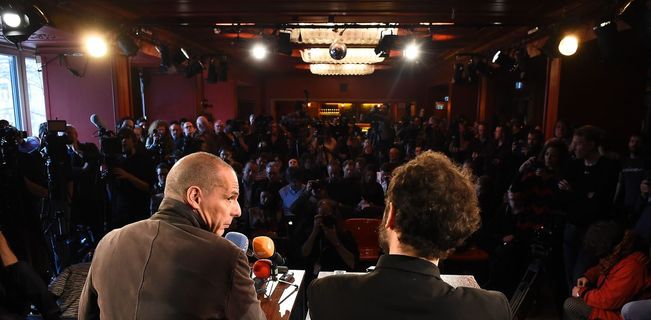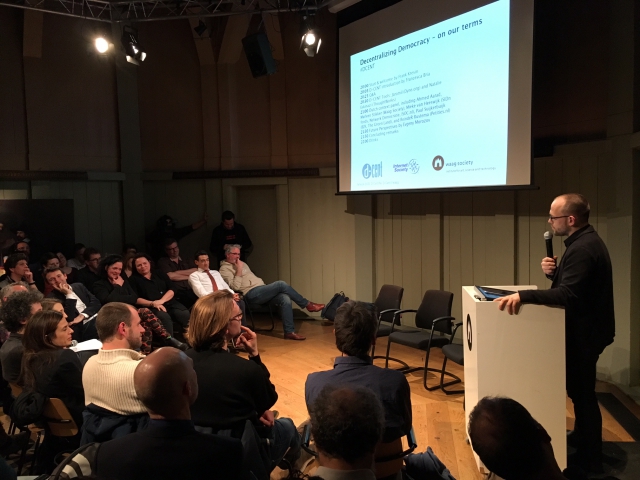‘Decentralizing Democracy – on our terms’ was organized and hosted by Waag Society on 8th March 2016
On Wednesday 8th March Waag society invited a selection of speakers to discuss democracy and digital software. The evening predominantly showcased outcomes of a two-year E.U funded project by D-Cent titled ‘Digital Tools for a Social Democracy’. Much of the focus was on designing software that empowers and encourages citizens to engage with and participate in politics. This ranged from local to national policies that make use of online platforms and networked devices to create a more active democratic system for the 21st century. This is an urgent issue, as many citizens are disillusioned with political systems that they see as inadequate bureaucratic organizations suffering to the demands of global finance. This was made visibly explicit in Greece, which recorded it’s lowest ever turnout to vote on the EU bailout referendum in July 2015 (62%). After the collective ‘no’ was overruled by further economic sanctions by the IMF, Tsipras’s government was publicly denounced as ineffective under the powers of EU and the International Monetary fund (IMF). The ineffectiveness of such Syriza –a grass roots people’s party – to implement the demands of it’s citizens at a time of such severe crisis tarnished the belief that democracy is adequately capable of representing the people and highlighted how it falls victim to, and serves the needs of the global market. The aftereffects of events such as this one leave the collective belief in democracy in shards and the next step is to go about resolving some of the deficiencies of democracy as a medium to change political systems. The questions that arise are those of provenance and scale – is it possible to design technological fixes to social problems and if so how do these solutions scale up from grass roots movements to empower and serve the masses?

D-cent http://dcentproject.eu/
The work of D-cent project displayed extensive research into this issue and it was inspiring to discover how far some of D-cent’s projects had manifested and even infiltrated and spread to different European regions to support a networked democracy. Jaromil Rojo, one of the project developers, provided a brief overview of different D-cent tools in action in different political parties across Europe –
• Barcelona: Participation Platform
• Reykjavik: Participatory budgeting platform
• Helsinki: Tracking municipal
• Madrid: Open consultation and direct democracy platform
The tools used by these political organizations range from participatory budgeting, where members vote on what the party spends its money on, to crowd sourced policy making, where members collaboratively edit documents that become legislation or party policy. Although these movements are geographically dispersed from Spain to Iceland, it is encouraging to discover they are not solely minor fringe parties and some have amassed into large national parties. For example Podemos is now the third largest party in Spain and The Five Star movement in Italy is now the second largest party and use the internet to mobilize and support what they call ‘direct democracy’.

The movement bases its principles on direct democracy as an evolution of representative democracy. The idea is that citizens will no longer delegate their power to parties, considered old and corrupted intermediates between the State and themselves, that serve the interests of lobby groups and financial powers. They will succeed only by creating a collective intelligence made possible by the internet.
The five star movement explicit credits the internet for enabling direct democracy to support collective organization and direct action. This belief is also apparent in the European movement lead by Yanis Varoufakis with the claim that ‘The EU will either be democratized or it will disintegrate!’ (Diem25) These various movements all are representative of a post 2008 financial crash attitude towards alternative forms of governance that give more responsibility to representative forms of democracy that use the internet to aid consensus based policy making. It is important to understand the context that has given birth to these recent developments and to discuss the potential consequences of some of the technical applications that are being developed by D-cent to aid social democracy and citizen empowerment.

Yanis Varufakis addresses Diem25
The concerns that come out of these movements are that of data privacy and trust, what happens when your political party stores your digital information and can the current dysfunctional relationship between citizen and state authority transition to that of trust and mutual dependence. The idea that anything must be better than the current political system motivates a large number of dissatisfied people to develop alternatives that add to a range of technical solutions to fix broken political procedures. Take for example the multinational tech firm ‘Smartmatic’ that is apparently providing ‘clean, honest voting’ via digital integration with the blockchain and in March was used as the method for voting on the US primaries in Utah (coinfox). The outsourcing of government tasks is partly due to lack of resources to govern in an expanding global economy but also the neo-liberal logic that the most efficient way to do this is through private consultancy firms like ‘SmartMatic’ that consequently end up reducing the dwindling power and responsibility of the welfare state. Whilst saying this I completely agree with many of the people’s parties that believe that democratic procedures such as voting are in dire need of a factory reset. However the prospective transition to online democratic platforms should be carefully observed in order to prevent the public falling into the arms of (more) private companies that will not only continue to capitalize on their data, but use it to write and enforce law. If these new technological services are going to serve the state (and benefit the people) it is important that they are not for profit, geared towards the commons and politically neutral as possible! In technical terms that should mean that the software should be open source and not a propriety private company such as ‘Smartmatic’, collectively self managed (not by one administrator, but many), publicly transparent and accessible. From what I understand this is what most of D-cent’s digital toolkit for social democracy is building, working alongside and supporting the needs and requirements of some of the peoples movements that are already using these approaches to improve democratic procedure and change policy making.

photo by Walter Green
There was time spent addressing some of the technical systems already in place, for example the basic, counter intuitive design of government online platforms such as the Dutch platform ‘DigiD’. Marleen Sticker from Waag Society reflected on her experiences with the Dutch national identification administration system and highlighted the difficulty in locating and accessing essential government services through the design of the DigiD interface. She argued that our online identity could be equally unique and expressive as our social media profiles which would encourage a stronger relationship between the user (citizen) and the interface (the government). A login identification tool presented by D-cent and Thoughtworks called ‘StoneCutter’ attempts to address this issue by creating a single encrypted identity that can be used across multiple platforms. Instead of using your Facebook account to login to an online service, you could use your government identity for multiple platforms selected by you. The time saved looking up endless passwords for different accounts is an immediate benefit of a unique identification tool and it would put your national identity at the core of your online experience. The long-term concerns are not just privacy and security related but question whether you would be more comfortable storing your data on a de-centralized p2p database (blockchain), It weighs up between a private tech firm probably based in San Francisco or in a government office. This last point highlights how these slight, technical fixes for democratic procedure represent giant shifts in social structures and hierarchical power orders. Secure, unique identities are required for online democratic systems and although nobody is sure yet how secure blockchain is, the common view is that its p2p infrastructure makes it an unquestionable improvement on the current government system. While I can see its advantages there should be consideration into how these small changes to democratic procedure are giant shifts in the relation of power and social order.

Image by Arron Tilley
While listening to Natalie Eskinazi from Thoughtworks I noticed the long list of private firms they consult for and considered the expansive potential that these new tools for democracy carry for office management, workplaces and human resources. The values that these digital tools promote, encouraging engagement and participation through consensus decision-making can also be used in technocratic office management applications to acquire further information about employees interests and wellbeing. Some of the consensus based voting tools presented by D-cent share similarities with the time saving office management applications such as ‘Doodle’ where people indicate their availability by voting for different dates. It is no surprise that software geared towards social engagement and consensus decision-making could be applicable in many sectors – schools, hospitals, and offices. Any organization that wants to facilitate consensus democratic decision-making through software can fork and implement D-cents’ code. While I am excited to hear about all the political ventures D-cent has served for noteworthy causes, there is always the unfortunate possibility that these promising tools will be implemented in less worthy causes such as improving time management and employee engagement in the workplace. This prospect of more participatory applications that promise to save time and increase workload efficiency, but end up turning into endless negotiation and, in office workplaces, into discussions about the size of the water cooler, or voting on where to go to lunch, is not something I am excited about.

Image by My Mind is an Island
I am not alone in my irrational fear towards technological solutionism as Evgeny Morozov, writer of ‘The Net Delusion’ (2011) and ‘To Save Everything, Click Here’ (2013) spoke at length on technocratic bureaucracy. He spoke of his concerns with technocratic governmentality and how socialist values have been absorbed into a neo-liberal, libertarian social code that dominates Western culture. Morozov insists that after many years of cynically ridiculing the liberal Californian optimism of ‘making apps to save the world’, he is now adopting a positive perspective towards software, applications and online platforms that attempt to build a more democratic society. That optimism lies in software such as D-cent galvanizing the left to self-organize socialist and people’s parties. However, he argues that historically, the right have a much better track record for exploiting computer software to their advantage and Morozov asks why socialists have not (yet) been able to create a crypto-currency that is not rooted in anarchic-capitalist ideology. Why do the majority of blockchain applications and smart contracts enforce propriety ownership such as copyright and intellectual property? How did the values of the commons get coerced into share economy services that are driven towards market domination? The commercialization of the WWW in the data driven economy has expanded the free market into citizens’ thoughts and fingertips. This expansion, over the past half a century, has left citizens with very little neutral space both online and offline, which causes Morovoz to argue that social democracy is (nearly) dead. Facing this crisis of socialist values the question is whether open-source applications such as D-cent can redesign social democracy from the bottom up. It is naive to believe in a solely technical solution to a social or political problem, however after learning about the successful adaption of D-cent software into some of the largest European political parties I anticipate wider use of D-cent software, from the office workplace to the occupied streets. If D-cent software continues to aid the fast moving expansion of national people’s parties like 5m movement in Italy, Podemos in Spain and Diem25 in Europe than perhaps a ‘technocratic socialism’ can facilitate a mobilized left that is networked and more visibly recognizable within European politics.



